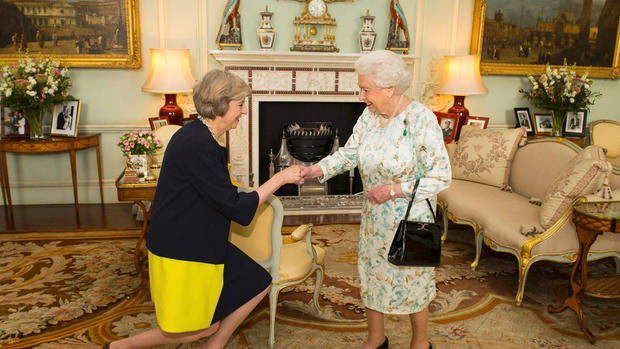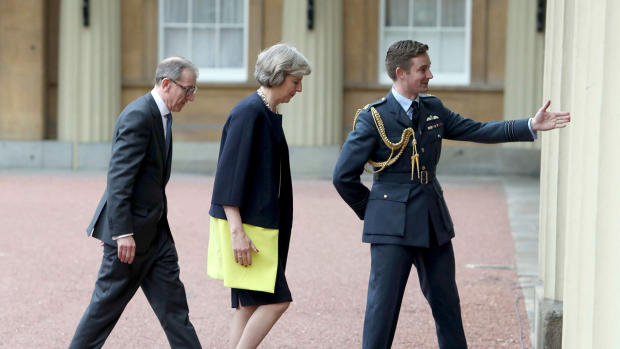Accepting queen's invite, Theresa May is now Britain's leader
LONDON - Theresa May became Britain's new prime minister on Wednesday, accepting an invitation to govern from Queen Elizabeth II after the resignation of David Cameron. She promised to lead a "one-nation" government dedicated to social justice and making "Britain a country that works for everyone."
Alluding to the tough negotiations that lie ahead over Britain's exit from the European Union, May said, "we face a time of great national change."
But she said Britain would "rise to the challenge" and forge "a bold new positive role" in the world.
May is the country's first female leader since Margaret Thatcher, the famously resolute politician -- nicknamed "The Iron Lady" -- who was the leader of the Conservative Party from 1975 to 1990, and prime minister from 1979 to 1990, the longest reign of the 20th Century in that post.
The other contenders had either stabbed each other in the back -- or the front -- or had fallen on their own swords.
May had actually argued for remaining in the EU. Now she says she'll try to get the best deal for Britain's departure. But she won't be doing anything quickly. An EU divorce has to be triggered by the country that's leaving, and May has said there's plenty to do before she actually pulls the trigger.
May began appointing new Cabinet ministers on Wednesday evening, and plans on adding a "Brexit" minister to oversee talks on a British EU exit from the 28-nation EU. There is also speculation that May will boost the number of women in top posts.
Former London Mayor Boris Johnson, who helped lead the campaign to abandon the European Union, was appointed U.K. foreign secretary. A U.S. State Department spokesman said Washington was looking forward to working with Johnson.
Philip Hammond, the former foreign secretary, will be replacing George Osborne as Treasury chief.
Euroskeptic Conservative lawmaker David Davis has been named UK minister for EU exit.
Liam Fox has been named Britain's new minister for international trade. May rounded off her first handful of Cabinet appointments with the choice of Fox, a former defense secretary who ran against her to be Conservative Party leader.
Fox was the first of five Tory leadership candidates to be eliminated in the race to replace Cameron -- which May won.
He was a strong backer of the successful "leave" side in Britain's EU referendum campaign.
Veteran Conservative euroskeptic David Davis has been appointed to lead Britain's exit talks with the European Union. Prime Minister Theresa May has named Davis to the newly created post of secretary of state for exiting the European Union.
Davis is a long-serving lawmaker who often clashed with May when she was home secretary over privacy and free-speech issues.
He has criticized British spies' snooping powers for being too intrusive. He has long advocated leaving the European Union, a plan he will now be in charge of implementing following Britain's vote to quit the bloc.
May has given her former job of home secretary to Amber Rudd, Britain's former energy secretary. That means two of the top four jobs in the government are held by women.
May, Britain's second female prime minister, is likely to boost the number of women in top jobs.
In a carefully orchestrated political ballet, Cameron made his final appearance as prime minister in Parliament, turning the usually raucous prime minister's questions session into a time for praise, thanks, gentle ribbing, cheers - and a sprinkle of criticism.
Then, after a rousing speech defending his government's legacy, he and his family left his home at 10 Downing Street for the last time and made the short drive to Buckingham Palace. Soon after, the palace confirmed that Cameron had "tendered his resignation as prime minister and First Lord of the Treasury, which her majesty was graciously pleased to accept."
Minutes later, May arrived at the palace, accompanied by her husband Philip. Royal officials released a photo of May curtseying to the monarch and confirmed the queen had "requested her to form a new administration."
May, 59, has been Britain's home secretary, in charge of immigration and law and order, for the past six years. She has the tough task of calming the country and global financial markets after the upheaval that has followed Brexit vote.
Although May backed remaining in the EU, she has reassured "leave" supporters that "Brexit means Brexit, and we will make a success of it."
She is under pressure - both from pro-Brexit Conservatives and other EU leaders - to start formal exit talks with the bloc. But Tony Travers of the London School of Economics said May would likely not rush to trigger Article 50 of the EU constitution, which starts a two-year countdown to a final exit.
"I don't detect Theresa May being an impulsive person," Travers said. "I think she's a cautious person, and the British political establishment needs to come to terms with this massive decision."
Cameron, 49, resigned after voters rejected his advice and decided to leave the European Union.
"It has been the greatest honor of my life to serve our country as prime minister over these last six years, and to serve as leader of my party for almost 11 years," he said outside 10 Downing St., accompanied by his wife Samantha and his children - 12-year-old Nancy, 10-year-old Elwen and 5-year-old Florence.
"It's not been an easy journey and of course we have not got every decision right, but I do believe that today our country is much stronger," Cameron said.
His last session in the House of Commons culminated in loud applause and a standing ovation from his Conservative colleagues.
"I will miss the roar of the crowd. I will miss the barbs from the opposition," Cameron said, promising to watch future exchanges as a regular Conservative lawmaker on the back benches.
He even poked fun at himself, reminding legislators of a barb he directed at then-Prime Minister Tony Blair more than a decade ago: "He was the future once."
"As I once said, I was the future once," Cameron noted, as his wife and children watched from the public gallery.
Despite the suddenness of Cameron's exit - less than three weeks after the June 23 referendum on Britain's membership in the EU - he appeared relaxed and confident as he absorbed both praise and carping from opposition lawmakers.
Replying to Labour leader Jeremy Corbyn, who is facing his own leadership challenge, Cameron poked fun at Labour's leadership turmoil, noting that the Tories had had "resignation, nomination, competition and coronation" while Labour is still working out the rules for its contest.
He found time to congratulate Wimbledon winner Andy Murray and other British players there, and rebuffed rumors that he does not like Downing St.'s resident cat, Larry - "I do!"
Cameron noted that he had answered 5,500 parliamentary questions in his six years in office. Amid the jokes and tributes in his farewell question period, he fielded questions about eye surgery and a health scandal, along with criticism about the rise in food banks and his part in calling the Brexit vote.
Trying to reclaim his legacy from his Brexit miscalculation, Cameron said his government had cut the deficit, overseen economic growth and legalized same-sex marriage. And he offered the closest thing he has ever given to a mission statement: "I believe that politics is about public service in the national interest."
Wednesday's newspapers, however, offered mixed judgments of Cameron, a politician toppled by his decision to call a referendum on EU membership - which he then lost.
The Daily Telegraph said in an editorial that Cameron "leaves behind a stronger country, a thriving economy and more chances to get on in life." But The Sun said Cameron had been "undone by his Olympian overconfidence," while the Guardian called him a "prime minister of broken promises."
Cameron drew praise from one old adversary, with European Commission President Jean-Claude Juncker saying he would miss the British leader who once derided him as a Brussels backroom bureaucrat.
"I have experienced a man who is serious, who is a fan of no-nonsense policy and who was delivering at each and every moment when things started to become serious," Juncker said.
Russian President Vladimir Putin thanked departing British Prime Minister David Cameron in a valedictory message and congratulated his successor Theresa May.
A Kremlin statement Wednesday said Putin thanked Cameron for cooperation and quoted him as saying "I hope that your rich political experience will be in demand in the future, both in the United Kingdom and in the international community."
To May, who succeeded Cameron on Wednesday, Putin "stressed the conviction that the preservation and augmentation of the significant potential of Russian-British cooperation in various fields that has been accumulated for a long time is in the fundamental interests of the two countries."

